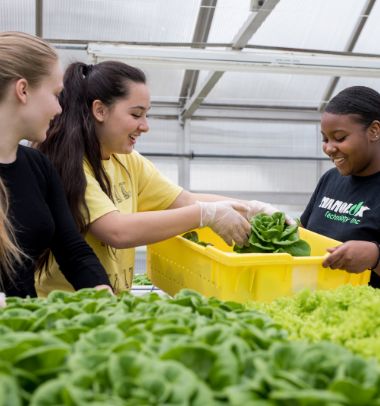This article originally appeared in the Gaston Gazette.
By Dashiell Coleman
There are a lot of good things budding at Webb Street School in Gastonia. Lately, the lettuce is chief among them.
Over the past year, Charlotte-based nonprofit 100 Gardens has been helping the special needs school operate an aquaponics facility, allowing students there to farm fish, grow lettuce and harvest it for local restaurants. It’s a combination of aquaculture — farmed seafood — and hydroponics — growing plants without soil — in a sustainable loop.
On Saturday, the nonprofit and the school showed off all their hard work.
The facility at Webb Street has four tanks of tilapia and two long rows of plant beds that keep lettuce floating — and growing — above water. It’s tranquil, though hot, inside the greenhouse, but it provides work that can help students focus on repetitive tasks that could translate into employment.
“It’s therapeutic, and our goal for our kids is for them to have job skills when they graduate,” Principal Kelli Howe said.
There are about 150 students at the school, which serves both juveniles and adults up to age 22 with developmental disabilities.
The aquaponics facility started with a $30,000 grant from the Glenn Foundation, and 100 Gardens got it up and running. The school is able to harvest 60-75 pounds of lettuce each week.
“We sell at the farmers market if our harvest is big enough,” Howe said.
The lettuce is also sold to Pour House in downtown Gastonia and the Holy Angels-run Cherubs Cafe in Belmont.
Additionally, the facility serves as something of a lab for science students at local high schools.
“They can monitor our pH,” Howe said. “They can monitor if we need to add calcium.”
The tilapia are still growing, and state regulations prevent fish from being sold by the facility. The team can, however, host a fish fry as a fundraiser — something that’s in the works.
The whole system runs off of one water pump: The water is recycled through plant beds, helping the lettuce grow.
“The plants are actually using up the nutrients and the waste created by the fish, returning clean water back to the fish after they start growing,” 100 Gardens President Sam Fleming said. “Now we can farm the fish and we can recycle 100 percent of the water. It’s good for the environment and we’re growing a ton of new vegetables.”
Webb Street is the only school in Gaston County doing aquaponics.
“When they come in here, they’re learning how to be productive members of society, and they’re doing it with this cool new technology,” Fleming said. “This is about getting people skills, it’s about trades and it’s also about saving the planet.”
There are 12 aquaponics gardens run by the nonprofit in the state, and the organization wants to grow that to 100 — hence the name.
“In just 10 years time, that 100 gardens can influence 200,000 kids and save millions of gallons of water and all of the food it’s producing. So it’s almost a social engineering project in some ways. We’re trying to transform a whole generation of youth.”
You can reach Dashiell Coleman at 704-869-1819 or on Twitter @DashiellColeman



